Now for something completely different from my previous posts, 7 answers to some common dental questions. Most of you know before serving in children’s ministry, I worked as a Registered Dental Hygienist. I graduated in 1986, but before going to hygiene school I worked as a dental assistant. Since 1981, there are approximately a half a bazillion different offices from Texas City to College Station where I cleaned teeth or assisted the dentist. I thought it might be fun to answer a few frequently asked dental questions.
Disclaimer: This post contains affiliate links, which means I may earn some money at no additional cost to you, if you click on the links I provide. Read the full dislcaimer here.
Here are 7 answers to some common dental questions.
I will try to answer in basic layman’s terms so if you are a not a dental professional these might help you. If you are in the dental profession, don’t judge me! Lol. (*Please note the disclaimer at the bottom of the post*).
-
What causes decay?
Sugar causes decay – Period. If there is decay, there is sugar in the diet somewhere. The bacteria in your mouth take the sugar that you eat and make acid. The acid eats through the enamel on your teeth. BOOM! Decay. Please don’t start with the “I just have bad teeth” thing. It’s sugar, I promise.
Now, with that being said, there are factors that can exacerbate this process or make it worse. For instance, smoking, medications, and autoimmune diseases are a few of the causes of dry mouth. When there is a decrease in saliva, your chances of decay increase. Your saliva neutralizes the acid excreted by the bacteria in your mouth and stops the decay process.
Once sugar enters your mouth, it takes 30 minutes for your saliva to neutralize the acid.
That means every time you sip on soda… it takes 30 minutes from that sip for the acid to go away, that is unless you take another sip…then 30 more minutes. You get the idea. I can’t tell you how many people say, “I only drink one soda a day.” The problem is, that one soda is sipped over a four hour time period. The saliva doesn’t have time to neutralize the acid. If you MUST drink a sugary drink, have it with your meal and then be done.
Don’t sip on sugary drinks for hours. This includes juices, energy drinks, Gatorade, milk, as well as sodas. You are asking for trips to see you favorite dentist with the added bonus of shots in your mouth and drilling on your teeth. But you know, if you enjoy that sort of thing…go for it.
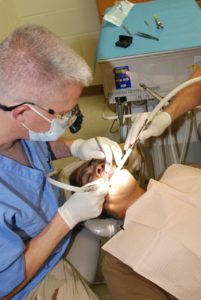
P.S. Dr. Pepper is devil juice.
Them’s fighting’ words in Texas. We love our Dr. Pepper. But Dr. Pepper and soft drinks eat holes in your teeth. My daughter did a science project one year and tested 5 sets of human teeth soaked in 5 different sodas. We weighed each tooth and changed the soda every week for 5 weeks. At the end of the 5 weeks, the teeth soaked in Dr. Pepper turned completely black and lost half of their weight! The others lost some dramatic weight but not half. She won first place, btw.
-
What is plaque?
Plaque is the soft sticky stuff that you can scrape off your teeth with your fingernail. That “furry sweater” feel when you need to brush. It is made up of the bacteria that live in yours and every living being’s mouths and the waste products the bacteria excrete. Yep, that means bacteria poop! The bacteria take the food that you eat, eats it, and excretes waste products. AKA…bacteria + bacteria poop = plaque.

-
So, then what is tartar?
After the soft plaque sits on your teeth for a while, the bacteria die. The bacteria and poop will calcify and become tartar. The difference in plaque and tartar (or in dental terminology, calculus) is plaque is soft and alive and calculus or tartar is dead and hard.
Tartar is porous or has little holes in it so it gives the bacteria a place to live. It becomes a home for the bacteria. The bacteria crawl the tiny holes or pores and die so it grows thicker and thicker. Did I mention it is dead bacteria? So it stinks and it’s gross. Want your teeth cleaned yet? If not it gets worse…
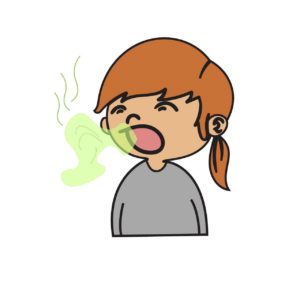
-
What is gingivitis?
Gingivitis is when the acid from bacteria causes ulcerations under the gums that you can’t see. This will cause bleeding during brushing or flossing and inflammation or swelling of the gums. This is the beginning stage of gum disease or periodontal disease. The parts of the word “gingi-” refer to the gum tissue or gingiva and “-itis” means inflammation. This stage of gum disease is reversible if the plaque and tartar are removed and kept off daily. With proper cleaning the gingiva will heal.
Flossing is important to remove bacteria from between the teeth to keep the bacteria from attacking the bone. It is important to see your dental professional regularly, especially if you are having bleeding gums. That is a sign of a problem. If any other part of your body were bleeding for no reason, you would go to the doctor right? So, go!
-
What is periodontal disease?
Gingivitis is actually the beginning stage of periodontal disease. If the plaque and tartar are not removed regularly, then the bone will become irritated and begin to break down. While gingivitis effects just the gum tissue and not the bone, the next stage is much more serious and not reversible. It is treatable, but once you start losing bone you cannot get it back. If allowed to progress, the teeth will loosen and eventually lead to tooth loss. Not to mention the smell from the infection, inability to eat properly, health problems, disfigurement, and impairment of speech.
Once allowed to progress to bone loss, your dental hygienist will need to do a deep cleaning with anesthesia to remove all of the tartar and diseased tissue. Once the teeth are cleaned and the gum tissue begins to heal, you may need to have your teeth cleaned every 2-3 months to keep the disease under control. Also, your dental professional will offer some advice with your home care to help you to stay healthy. After all, 99% of keeping your teeth clean is what you do at home not what the dental professional does in the dental chair.
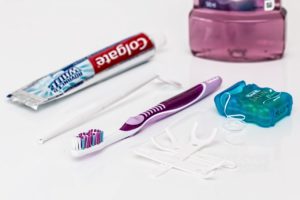
6. Which brings us to, what kind of toothbrush is best?
You should ALWAYS, ALWAYS, ALWAYS use a soft brush. I know, when you are used to a hard brush, a soft one feels like it isn’t doing anything. Believe me it is! Remember I said the plaque itself is soft? If you use a hard brush, you can actually damage your gums and scrub into the enamel causing sensitivity. Once you lose enamel, it doesn’t come back. USE A SOFT BRUSH!
When changing from a harder brush, at first you may need to change your brush every few weeks because you will smash it trying to scrub as hard as your old hard brush did. Pitch the damaged brush and get a new one. The flattened bristles can cause damage also and won’t clean thoroughly. The tips of the bristles are what actually clean the plaque away.
Get rid of a toothbrush if the bristles are flayed or smooshed or not like new.
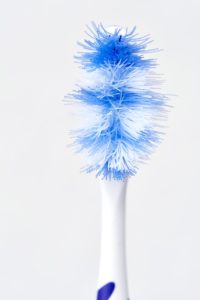
Most importantly, time yourself and brush for 2 minutes. Thirty seconds in each quadrant of your mouth. It takes 2 minutes of brushing to remove the plaque completely.
Brush longer…not harder. Trust me on this; get a soft brush or better yet buy an automated brush if you can, like Sonicare or OralB with a timer. Those are so worth the money. They are like “brushing for dummies”. I use a Sonicare and love it. Make sure it is a model with a 2 minute timer. I posted links for some with timers below but there are various models for each brand. However, you still need to replace Sonicare and OralB brush heads every three months or they don’t clean well.
-
What about the best toothpaste?
There’s a tough question. Man…the choices we have are insane! I’m a hygienist and the sex appeal of the packaging confuses even me. I want all of the goodies…cleaning, whitening, and fresh breath. Sensitivity is a whole other topic. So, what do you choose?
All toothpaste is basically soap (yep, sodium laurel sulfate, read the label…it’s soap), silica…that is sand, and fluoride. Those are the ingredients that actually help clean. All of the rest of the stuff is for flavoring and sex appeal to sell their toothpaste.
If the ADA approves the toothpaste, it is fine.
I can tell you the ones with tartar control can cause the tissue on inside of your mouth to peel or slough. It can also cause staining and sensitivity. Even the ones with whitening can sometimes stain, weird huh? I steer clear of all of that mess. I don’t recommend mouthwashes either. They can burn the soft tissues also and cause problems. Oh, and burning does not mean it is working! UGH…that statement is a pet peeve of mine. Some of them even stain your teeth.
My home care consists of flossing, brushing with my Sonicare for 2 minutes with plain, red box Colgate twice daily and having my teeth cleaned every 6 months.
So many product can cause sensitivity, staining and sloughing of tissue. When I say sloughing, it looks like slimy type stuff. It can appear as strings between your lips when you open your mouth or run your finger inside your cheek.
That slimy stuff is your soft tissue getting burned and peeling. This is caused by the flavorings they put in the products to cover up all of the chemicals in them. After a while, it can cause soreness. Like I said, plain Colgate is just my personal preference. Any brand with the ADA seal on the back is good toothpaste. You don’t need all of the bells and whistles. Save your money.
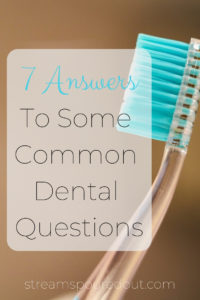
There you go. That was 7 answers to some common dental questions.
If you have more let me know, I will do my best to answer if I can. Like I said, I’m not a dentist. Nor can I can possibly answer specific questions without an exam.
The best plan is to see your hygienist every 6 months. Your dental hygienist is your friend. She will work with you and the dentist to keep you healthy. We always joke that dentistry is the only profession that works to put itself out of business. Although, my husband is a retired firefighter and I guess they want to go out of business also. Lol!
Don’t forget to floss.

I love you guys,
*Disclaimer: I am not a dentist nor do I play one on TV. The answers are just my opinion and not medical advice. The information I provide is accurate and true to the best of my knowledge, but there may be omissions, errors or mistakes. Streams Poured Out blog posts are for information purposes only and shouldn’t be seen as financial, health, nutritional, medical, legal, or professional dental advice.
*This post may contain affiliate links. For more information, see my disclosure page
Ecclesiastes 11:10
So refuse to worry, and keep your body healthy.
 Copyright secured by Digiprove © 2019 Shawna Novak
Copyright secured by Digiprove © 2019 Shawna Novak



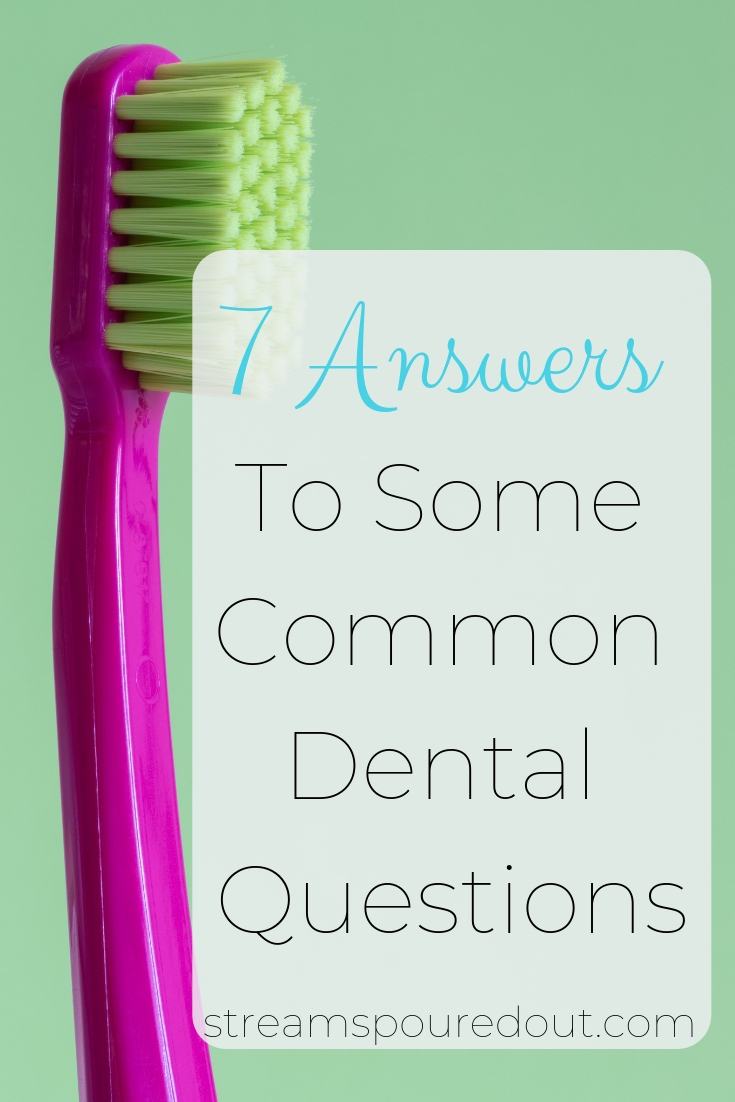
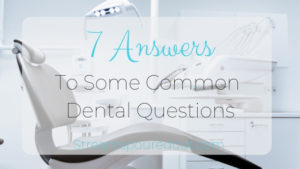




Why did you and Tony have such different teeth? You were only 19 months apart, you stood side by side to brush your teeth, you ate and drank the same things but he had so much trouble with tooth decay as a child. It w!as so bad we had to have several baby teeth capped to prevent them from decaying his permanent ones and you never had a cavidy!
Good question. I think it had something to do with his saliva or lack of saliva. Possibly from his autoimmune disease, when his rheumatoid arthritis was active. He could have had other AI diseases contributing to it. The doctors didn’t understand as much as they do today. Who knows? I love you mom.
Wow! Great information! Thank you! I also use a water pic several times a week and love it, but I noticed you didn’t mention those?
Thanks Laurel. I appreciate you stopping by the website. I didn’t even think about waterpiks. There is so much to cover and this post was already very long. Great question! I love waterpiks. They are messy, so some people won’t use them. But yes! They are wonderful for removing debris between the teeth when used properly. Thanks for the suggestion and for visiting! Shawna
Well that was an eye opener! Thanks for the information! I need new toothbrushes!
Haha! Sometimes I forget I’m not in children’s ministry. It would get the kid’s attention when you explain in everyday terminology. There are grown men from elementary Sunday school classes from years past that will still text me about their teeth. They got Jesus and oral hygiene lessons in one. Lol! Thanks for commenting! Shawna